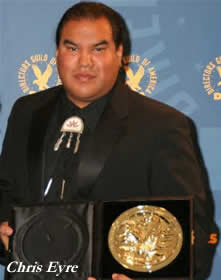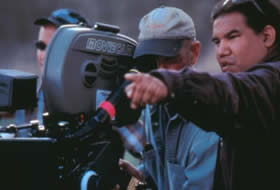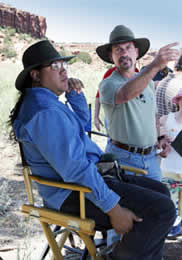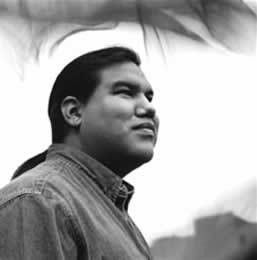 For a portion of his film career, Native American Director/Producer Chris Eyre made his mark in New York City, as a tour de force in the film industry. Originally hailing from Oregon and with his 1995 NYU Tisch School of the Arts Grad Film, entitled, “Tenacity”, it paved the way for his visions to take fruition on a larger scale.
For a portion of his film career, Native American Director/Producer Chris Eyre made his mark in New York City, as a tour de force in the film industry. Originally hailing from Oregon and with his 1995 NYU Tisch School of the Arts Grad Film, entitled, “Tenacity”, it paved the way for his visions to take fruition on a larger scale.
With the phenomenal success of “Tenacity” (filmed in New York State) at numerous festivals, including a screening at Sundance, Chris entered the Sundance Institute’s Directing Workshop.
Sundance’s prestigious Directors workshop gave rise to Chris’ next project within the program, which came in the  form of the 1998 hit film, “Smoke Signals”, eventually taken on board by Miramax’s Co-Chair Harvey Weinstein. “Smoke Signals” went on to critical acclaim and fostered continued success for Chris Eyre’s future artistic projects: “The Doe Boy”, “Skins”, “Skinwalkers”, “A Thousand Roads”, and “Thief of Time”. I had a moment to chat with Chris and ask a few questions regarding his current and future endeavors.
form of the 1998 hit film, “Smoke Signals”, eventually taken on board by Miramax’s Co-Chair Harvey Weinstein. “Smoke Signals” went on to critical acclaim and fostered continued success for Chris Eyre’s future artistic projects: “The Doe Boy”, “Skins”, “Skinwalkers”, “A Thousand Roads”, and “Thief of Time”. I had a moment to chat with Chris and ask a few questions regarding his current and future endeavors.
Tobe Roberts: Is there one particular project that you have untaken in the past that has acted as a catalyst or inspiration for future projects?
Chris Eyre: Of the six features I’ve made as a Director, I would say that the biggest inspirations are still my first two features- “SMOKE SIGNALS” and “SKINS”. The reason is that they were both total “passion” projects. SMOKE SIGNALS, inspired me to work in a heartfelt, human-way. “SKINS”, taught me the importance of personal vision and holding to that despite the outcome. I still believe great movies should be made before the industry professionals add the genre, cast and marketability of the picture.
Tobe: Was there anyone who inspired you growing up as a storyteller?
Chris: Although I don’t play, music has been a major inspiration. Music is an emotion, a feeling and it is that feeling that I use over and over again when I am working. Whether it is dreaming, directing or editing, music has provided a vehicle for my feelings that I then translate to my work.
 Tobe: As a Producer on both “California Indian” & “Imprint”, was there any aspect that was most challenging in regard to logistical elements for the production?
Tobe: As a Producer on both “California Indian” & “Imprint”, was there any aspect that was most challenging in regard to logistical elements for the production?
Chris: Recently, I produced two films- “California Indian” and “Imprint”- they are both Digital Feature made in the “no-budget” style of filmmaking. It reminded me of making the “no-budget” films that friends would mount in the early 90’s in NYC when I was in Film School. Basically, everyone is doing it for the love of the project and they are willing to change many hats all the time. Making these types of movies is like blindfolding yourself and trying to shoot bugs off your foot. Eventually, 9 times out of 10, you’re going to end up with a hold in your foot. But, the real challenge is, despite the limited financial resources you have, it boils down to what you can make of the movie and what you can make of it in the editing room. Making these projects is reminiscent to the response Edmond Hillard gave after climbing Everest, “Because it was there.”
Tobe: What types of projects do you tend to develop and why? Are there any adaptations to screen that you are currently working on?
Chris: The projects that I tend to like are that of contemporary native America because it is an amazing world, of not only America but it then has an overlay of religion, language and culture that make it unique. It just seems to me like such an untapped canvas. Most of the time you see this world in movies, it is all wrong. There is a tremendous amount of room to further uncover this world that is right in front of us.
There is a tremendous amount of room to further uncover this world that is right in front of us.
Tobe: Is there anyone you would most like to collaborate with in the near future?
Chris: There are so many people that I would love to collaborate with. In addition, there are many people that I do collaborate with, whether it is a phone conversation or dinner, or a real opportunity to work together. I am driven by other artists and learn from them all the time.
Tobe: What message would you like to impart to those who wish to venture into filmmaking?  Chris: That it is not about filmmaking, it is not about the technology which continues to change. It is about the personal vision whether you are making a major studio feature or a low budget passion project. You have to have a vision and spirit that endows the life of the movie. Understanding this and looking at the bigger picture is as important as the tight, meticulous work that will also have to happen. It starts with a vision not a new camera.
Chris: That it is not about filmmaking, it is not about the technology which continues to change. It is about the personal vision whether you are making a major studio feature or a low budget passion project. You have to have a vision and spirit that endows the life of the movie. Understanding this and looking at the bigger picture is as important as the tight, meticulous work that will also have to happen. It starts with a vision not a new camera.
Tobe: During your time at NYU’s Tisch School of the Arts for Graduate Film, was there a word of pervasive advice that remains with you today?
Chris: On the first day of class, Chair Ian Maitland stated, “After you finish your Masters Degree in Filmmaking here, 9 out of 10 of you, will go on to be just movie-goers…”I thought to myself…not me.
Tobe: Chris, thanks for taking the time out and for your insight and your inspiring words.

